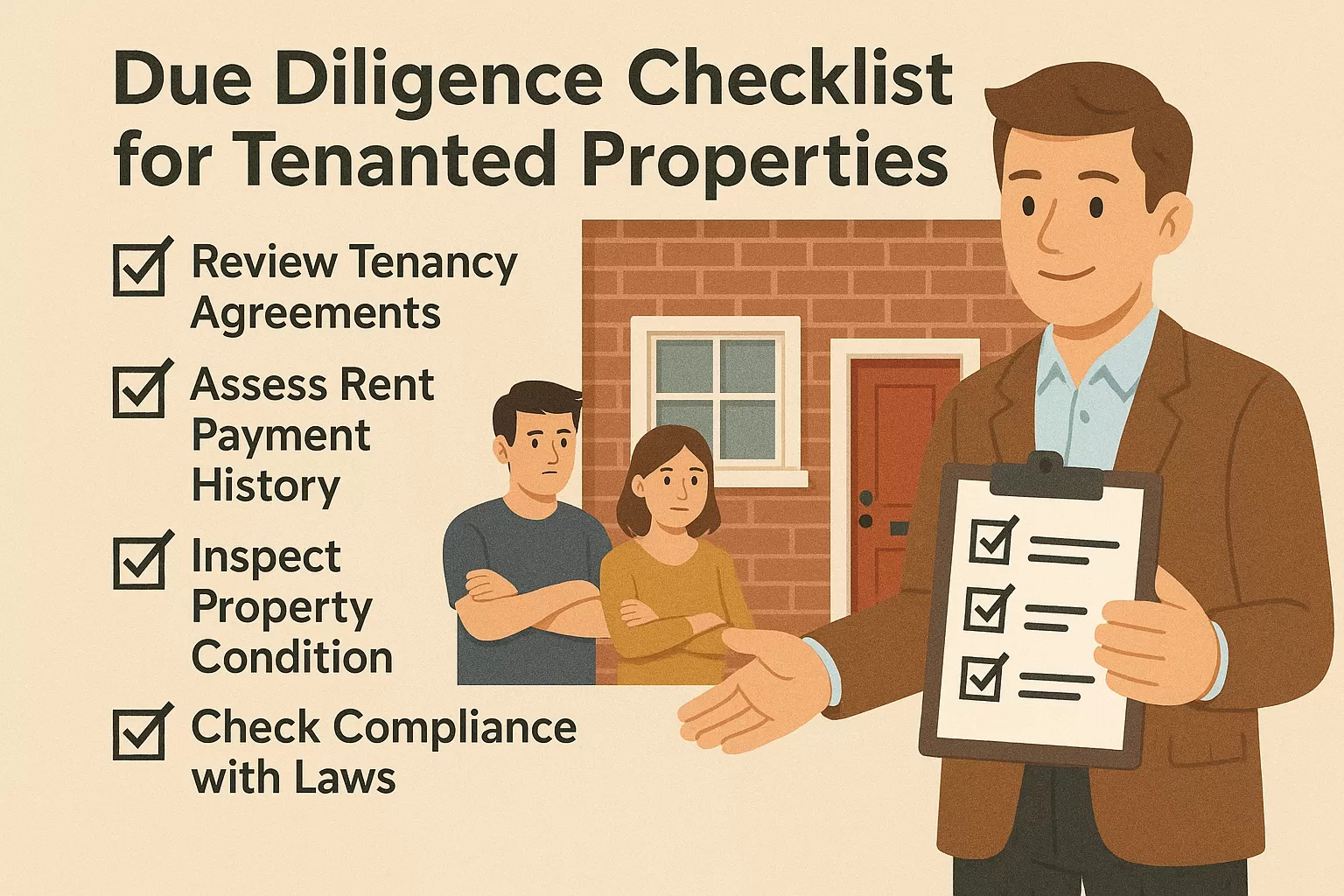Selling a property with sitting tenants presents unique challenges and considerations that don’t exist with vacant properties. Landlords must navigate a complex legal landscape that balances their right to sell with tenants’ rights to security of tenure. Understanding these legal rights and obligations is essential for a smooth transaction that protects all parties. This comprehensive guide analyses the legal framework governing tenanted property sales in the UK and provides practical advice for landlords considering this path.
Understanding Tenancy Types and Their Impact on Sales
The type of tenancy agreement in place significantly affects your legal position when selling.
Assured Shorthold Tenancies (ASTs)
Most private residential tenancies in the UK are Assured Shorthold Tenancies, which provide specific legal protections:
- Fixed-term ASTs: During the fixed term, landlords cannot evict tenants to sell the property
- Periodic ASTs: After the fixed term expires, tenancies typically become periodic (month-to-month or week-to-week)
- Section 21 notices: Landlords can serve these “no-fault” eviction notices to end periodic tenancies, requiring at least two months’ notice
- Section 8 notices: Used when tenants have breached tenancy terms, with notice periods varying based on the grounds cited
When selling with tenants in situ under ASTs, the tenancy transfers to the new owner with all existing terms intact.
Assured Tenancies
Less common today, assured tenancies offer stronger tenant protections:
- Tenants have the right to remain indefinitely unless the landlord has specific grounds for possession
- These grounds are limited and generally require tenant fault (e.g., rent arrears, property damage)
- Selling with sitting assured tenants significantly limits the buyer pool to investors only
Regulated Tenancies
These older tenancies (pre-1989) provide the strongest tenant protections:
- Tenants have substantial security of tenure and rent control protections
- Eviction is extremely difficult without specific statutory grounds
- Properties with regulated tenants typically sell at significant discounts to vacant possession value
Commercial Tenancies
Commercial tenancies operate under different legal frameworks:
- Governed primarily by the Landlord and Tenant Act 1954
- Commercial tenants often have the right to lease renewal
- Assignment clauses may restrict the landlord’s ability to sell without the tenant’s consent
Legal Obligations When Selling Tenanted Property
- Property sale with tenant rights in place.
Respecting the Tenancy Agreement
The existing tenancy agreement remains legally binding regardless of property ownership changes:
- All terms and conditions transfer to the new owner
- Rent amounts, payment dates, and other conditions remain unchanged
- Fixed-term agreements cannot be terminated early simply due to the sale
- Deposit protection arrangements must be maintained and transferred
Tenant Notification Requirements
Landlords must follow specific notification procedures:
- Provide written notice of intention to sell (good practice, though not always legally required)
- Give reasonable notice for viewings (typically 24-48 hours)
- Inform tenants when a sale is agreed
- Provide details of the new landlord upon completion
Right of First Refusal
In certain circumstances, tenants may have the legal right to purchase the property before it’s offered to other buyers:
- This applies primarily to regulated tenants in converted buildings
- Managed by the Landlord and Tenant Act 1987
- Failure to comply can result in illegal penalties
- Specific procedural requirements must be followed
Deposit Protection Obligations
Proper handling of tenant deposits during a sale is legally required:
- Deposits must remain protected in an approved scheme
- The new landlord must be registered as the deposit holder
- Tenants must be informed of any changes to deposit protection arrangements
- Failure to comply can result in penalties of 1-3 times the deposit amount
Practical Approaches to Selling Tenanted Property
Selling with Tenants in Situ
This approach maintains rental income throughout the sales process and appeals to investors:
- Legal requirements: Ensure all tenancy documentation is current and compliant
- Tenant cooperation: Establish clear communication and viewing protocols
- Marketing strategy: Target investment buyers specifically
- Pricing considerations: Typically 10-20% below vacant possession value
- Disclosure obligations: Provide complete tenancy information to potential buyers
Selling with Vacant Possession
If you prefer to sell without tenants:
- Legal process: Serve appropriate notices (Section 21 for periodic ASTs)
- Timing considerations: Allow sufficient time for notice periods and potential delays
- Tenant negotiations: Consider offering incentives for early voluntary departure
- Legal risks: Ensure all eviction procedures strictly follow legal requirements
- Market advantages: Typically achieves higher sale prices and attracts a broader buyer pool
Negotiated Solutions
Often, the most practical approach involves finding mutually beneficial arrangements:
- Cash incentives: Offering tenants financial compensation for voluntary vacation
- Relocation assistance: Helping tenants find alternative accommodation
- Flexible timing: Coordinating move-out dates with tenant needs
- Buyer negotiations: Arranging for buyers to inherit only certain tenancies
Viewings and Access Rights
Managing property viewings with sitting tenants requires careful legal navigation.
Landlord’s Right of Access
The legal position on access for viewings:
- Landlords must give at least 24 hours’ registered notice
- Tenants have the right to refuse access even with notice
- Entering without permission could constitute trespass
- Tenancy agreements may contain specific clauses regarding sales viewings
Best Practices for Viewings
To maintain good relations and facilitate the sale:
- Establish a viewing schedule that minimizes disruption
- Consider offering compensation for viewing inconvenience
- Respect tenant privacy and property
- Arrange accompanied viewings rather than providing keys to prospective buyers
- Address tenant concerns about security and personal belongings
Dealing with Difficult Situations
- Selling with tenant rights and duties involved.
When tenants resist viewings:
- Review the tenancy agreement for specific viewing provisions
- Engage in open dialogue about concerns and potential solutions
- Consider offering incentives for cooperation
- As a last resort, seek legal advice regarding your particular circumstances
- Remember that forcing entry is never legally justified for routine viewings
Disclosure Requirements to Buyers
Full disclosure of tenancy details is essential to avoid future disputes.
Essential Information to Provide
Buyers should receive:
- Complete copies of all tenancy agreements
- Tenant payment history and current rent amounts
- Details of any ongoing disputes or issues
- Deposit protection information
- Compliance documentation (gas safety, EPC, electrical safety, etc.)
- Correspondence history with tenants
- Inventory and condition reports
Legal Implications of Non-Disclosure
Failing to disclose material information about tenancies can have serious consequences:
- Potential misrepresentation claims
- Contract rescission in severe cases
- Compensation claims for financial losses
- Damage to professional reputation
The Direct Sale Alternative for Tenanted Properties
For landlords seeking a more straightforward solution, specialized property buyers offer an alternative path:
- Purchase with tenants in place: No need to evict or disrupt tenants
- Simplified process: Reduced viewing complications and buyer concerns
- Certainty: Eliminating the risk of sales falling through due to tenancy issues
- Speed: Typically faster completion than traditional market sales
- Reduced legal complexity: Experienced buyers familiar with tenanted property transfers
These specialized buyers are particularly valuable for properties with problematic tenancies, regulated tenants, or situations requiring quick sales without tenant disruption.
Common Legal Pitfalls and How to Avoid Them
Improper Notice Procedures
Failing to follow correct legal procedures for notices can invalidate them:
- Ensure notices contain all required information
- Use the prescribed forms where applicable
- Serve notices via appropriate methods with proof of delivery
- Calculate notice periods correctly, accounting for weekends and holidays
- Consider having notices professionally prepared or reviewed
Deposit Protection Errors
Mistakes with deposit protection during ownership transfers are common:
- Ensure deposits remain protected throughout the sale process
- Complete the formal transfer of deposit protection to the new landlord
- Provide written confirmation of new arrangements to tenants
- Maintain clear records of all deposit transactions and communications
Tenancy Agreement Transfer Issues
- Selling a home that’s currently tenanted.
Problems can arise when transferring tenancy agreements:
- Ensure all tenancy terms are properly documented
- Address any ambiguities or verbal agreements before the sale
- Provide complete tenancy files to the buyer
- Formally notify tenants of the change in landlord
- Ensure rent payment arrangements are updated
Compliance Documentation Gaps
Missing compliance documentation can create legal liability:
- Ensure all safety certificates are current (gas, electrical, EPC)
- Verify that all HMO licensing requirements are met if applicable
- Confirm that all furnishings comply with fire safety regulations
- Provide evidence of Right to Rent checks
- Document compliance with deposit protection requirements
Conclusion
Selling a tenanted property involves navigating a complex legal landscape that balances landlord rights with tenant protections. Landlords can achieve successful sales while minimizing legal risks by understanding the legal framework governing different tenancy types, respecting tenant rights, and fulfilling all disclosure obligations.
Specialized property buyers offer a streamlined alternative for those seeking to avoid the complexities of selling tenanted properties on the open market. These buyers purchase properties with sitting tenants, eliminating many legal challenges and uncertainties associated with traditional sales.
Professional legal advice remains essential whether you choose a traditional market approach or a direct sale. The specific circumstances of each tenanted property sale vary significantly, and tailored guidance ensures compliance with all legal needs while protecting your financial interests.








